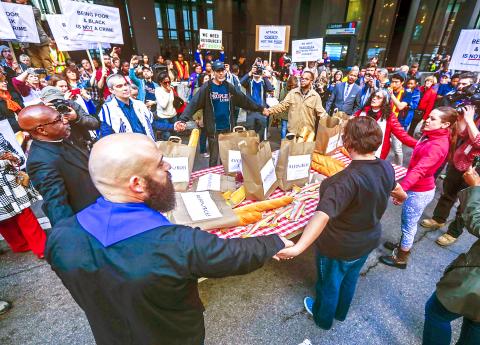The administration of US President Donald Trump plans to consider almost all illegal immigrants subject to deportation, but will leave protections in place for immigrants known as “dreamers,” who entered the US illegally as children, according to official guidelines released on Tuesday.
The US Department of Homeland Security guidance to immigration agents is part of a broader border security and immigration enforcement plan in executive orders that Trump signed on Jan. 25.
Former US president Barack Obama issued an executive order in 2012 that protected 750,000 immigrants who had been brought to the US illegally by their parents. Trump has said the issue is “very difficult” for him.

Photo: EPA
Trump campaigned on a pledge to get tougher on the estimated 11 million illegal immigrants in the US, playing on fears of violent crime, while promising to build a wall on the border with Mexico and to stop potential terrorists from entering the nation.
Trump’s planned measures against illegal immigrants have drawn protests, such as an event last week that activists called “A Day Without Immigrants” to highlight the importance of foreign-born people, who account for 13 percent of the US population, or more than 40 million naturalized citizens.
A banner declaring “Refugees Welcome” was posted on the base of the Statue of Liberty in New York, before park rangers removed it on Tuesday, WABC TV reported.
Homeland security officials, on a conference call with reporters, said that although any immigrant in the nation illegally could be deported, the agency would prioritize those deemed a threat.
These include recent entrants, those convicted of a crime and people charged, but not convicted of a crime. Some details of the guidelines were detailed in a draft memo seen on Saturday.
Many of the instructions will not be implemented immediately because they depend on US Congress, a public comment period or negotiations with other nations, the officials said.
Mexican immigration officials immediately objected to part of the new rules.
The guidance also calls for the hiring of 10,000 more US Immigration and Customs agents and 5,000 more US Customs and Border Protection agents.
The new rules would subject immigrants who cannot show they have been in the nation for more than two years to “expedited removal.” Currently, only migrants apprehended near a US border who cannot show they have been in the nation for more than 14 days are subject to rapid removal.
The agency also plans to send non-Mexican migrants crossing the southern US border back into Mexico as they await a decision on their case.
The officials said this plan would be dependent on partnerships with the Mexican government and would not be implemented overnight.
The guidelines were released a day before US Secretary of State Rex Tillerson and US Secretary of Homeland Security John Kelly were due in Mexico City for talks with Mexican President Enrique Pena Nieto and officials.
An official from the Mexican Secretariat of Foreign Affairs said the government would tell Kelly’s team that it was “impossible” for Mexico to accept deportees or asylum applicants from foreign nations, and would ask them to explain their plan.
The deportation of Mexicans would be one of the government’s major concerns at the meeting, said the official, who declined to be named.

MAKING WAVES: China’s maritime militia could become a nontraditional threat in war, clogging up shipping lanes to prevent US or Japanese intervention, a report said About 1,900 Chinese ships flying flags of convenience and fishing vessels that participated in China’s military exercises around Taiwan last month and in January have been listed for monitoring, Coast Guard Administration (CGA) Deputy Director-General Hsieh Ching-chin (謝慶欽) said yesterday. Following amendments to the Commercial Port Act (商港法) and the Law of Ships (船舶法) last month, the CGA can designate possible berthing areas or deny ports of call for vessels suspected of loitering around areas where undersea cables can be accessed, Oceans Affairs Council Minister Kuan Bi-ling (管碧玲) said. The list of suspected ships, originally 300, had risen to about 1,900 as

Japan’s strategic alliance with the US would collapse if Tokyo were to turn away from a conflict in Taiwan, Japanese Prime Minister Sanae Takaichi said yesterday, but distanced herself from previous comments that suggested a possible military response in such an event. Takaichi expressed her latest views on a nationally broadcast TV program late on Monday, where an opposition party leader criticized her for igniting tensions with China with the earlier remarks. Ties between Japan and China have sunk to the worst level in years after Takaichi said in November that a hypothetical Chinese attack on Taiwan could bring about a Japanese

Right-wing political scientist Laura Fernandez on Sunday won Costa Rica’s presidential election by a landslide, after promising to crack down on rising violence linked to the cocaine trade. Fernandez’s nearest rival, economist Alvaro Ramos, conceded defeat as results showed the ruling party far exceeding the threshold of 40 percent needed to avoid a runoff. With 94 percent of polling stations counted, the political heir of outgoing Costa Rican President Rodrigo Chaves had captured 48.3 percent of the vote compared with Ramos’ 33.4 percent, the Supreme Electoral Tribunal said. As soon as the first results were announced, members of Fernandez’s Sovereign People’s Party

MORE RESPONSIBILITY: Draftees would be expected to fight alongside professional soldiers, likely requiring the transformation of some training brigades into combat units The armed forces are to start incorporating new conscripts into combined arms brigades this year to enhance combat readiness, the Executive Yuan’s latest policy report said. The new policy would affect Taiwanese men entering the military for their compulsory service, which was extended to one year under reforms by then-president Tsai Ing-wen (蔡英文) in 2022. The conscripts would be trained to operate machine guns, uncrewed aerial vehicles, anti-tank guided missile launchers and Stinger air defense systems, the report said, adding that the basic training would be lengthened to eight weeks. After basic training, conscripts would be sorted into infantry battalions that would take